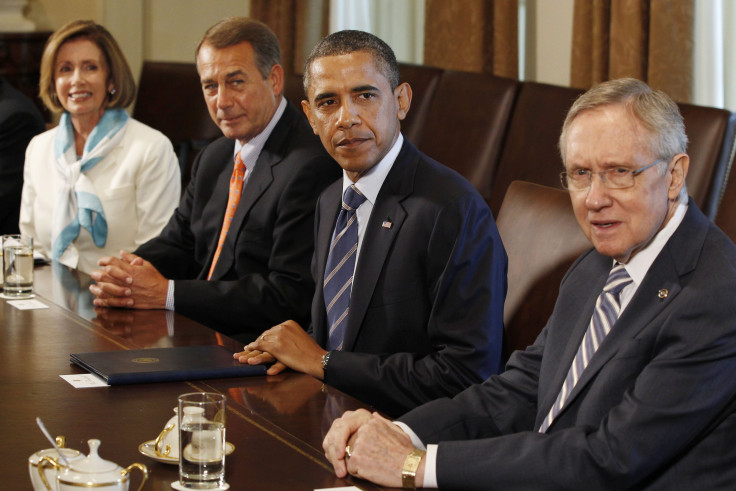Debt Ceiling 2013: Obama-Republicans Round Two; How To End Shutdown Now Sticking Point

President Barack Obama will be conducting a second round of talks with Republicans on Friday -- this time with Senate GOP leaders -- to discuss ways to break the impasse, end government shutdown, and get a debt limit increase before the Oct. 17 deadline.
On Thursday, seven days out from a possible default, the president met with House GOP leadership but there was no immediate solution to the nation’s fiscal woes. That meeting, which has been described by the White House as “good,” came after Obama said he’s open to a short-term debt ceiling fix and House Speaker John Boehner, R-Ohio, responded with a proposed a six-week extension.
Reports are that the House GOP could prevent a default and end the shutdown in exchange for cuts in benefits programs. According to The Associated Press, the proposal would also provide some relief from the sequester, automatic across-the-board spending cuts that began March 1. These would be repalced by the slashes to benefits program backed by the president.
Ahead of Friday’s get-together, Senate Majority Leader Harry Reid, D-Nev., expressed on the Senate floor his dislike for a short-term increase in the nation’s borrowing authority. Reid, instead, will proceed to vote on a longer-term debt ceiling bill that would be in effect through Dec. 31, 2014. This, he said, would provide the confidence the market needs.
“If we allow the United States of America to default on its debt for the first time in history, it will be a black mark on our reputation and a financial disaster that will spark a global recession,” Reid said. “That is my opinion. But it is not my opinion alone. I have come to that belief by listening to the most respected economists, bankers and business leaders.”
The majority leader snubbed the Republicans' six-week offer, saying that isn't enough to give the economy the confidence needed to continue its recovery. The Senate will vote on Saturday on its proposed 15-month debt limit bill, which Reid said gives “the economy certainty and stability over the long term.”
Thursday’s meeting was the first sign of a thaw in the positions that Congessional Republicans and Democrats and Obama have taken through the fiscal ordeal. For weeks, the Republican-controlled House was passing bills that attacked Obamacare, trying to defund, delay or even repeal it, while the Senate, controlled by Democrats, voted down all attempts. Obama was originally insistent there would’ve been no negotiations with Republicans unless they reopened the government and ceased their threat of a default. Republicans are, however, reluctant to fund the government until the president and Democrats agree to make some changes to the 2010 health-care law.
It looks as if efforts to defund Obamacare have been placed on a brief hold, as Republicans focus on a repeal of the medical device tax -- a 2.3 percent levy that helps fund the health-care law.
Sen. Susan Collins, R-Maine, has proposed reopening the government six months in exchange for a permanent repeal of that tax, which is expected to bring in about $3 billion per year over the next 10 years.
In the meantime, Boehner has appeared more flexible, saying at news conference on Thursday that they will move a temporary increase with agreement to go to conference later.
“I don’t want to put anything on the table. I don’t want to take anything off the table,” he said.
Just before leaving to go to the White House, Senate Minority Leader Mitch McConnell, R-Ky., said the meeting is a good opportunity to have a frank exchange with the president, “If that’s what he wants.”
McConnell criticized the president, saying his position can be summed up in three words, “He won’t negotiate.”
© Copyright IBTimes 2024. All rights reserved.






















